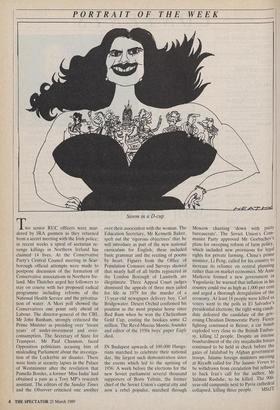PORTRAIT OF THE WEEK
Storm in a D-cup Two senior RUC officers were mur- dered by IRA gunmen as they returned from a secret meeting with the Irish police; in recent weeks a spiral of sectarian re- venge killings in Northern Ireland has claimed 14 lives. At the Conservative Party's Central Council meeting in Scar- borough official attempts were made to postpone discussion of the formation of Conservative associations in Northern Ire- land. Mrs Thatcher urged her followers to stay on course with her proposed radical programme including reforms of the National Health Service and the privatisa- tion of water. A Mori poll showed the Conservatives one point only ahead of Labour. The director-general of the CBI, Mr John Banham, strongly criticised the Prime Minister as presiding over 'locust years' of under-investment and over- consumption. The Secretary of State for Transport, Mr Paul Channon, faced Opposition politicians accusing him of misleading Parliament about the investiga- tion of the Lockerbie air disaster. There were hints at security lapses in the Palace of Westminster after the revelation that Pamella Bordes, a former 'Miss India' had obtained a pass as a Tory MP's research assistant. The editors of the Sunday Times and the Observer criticised one another over their association with the woman. The Education Secretary, Mr Kenneth Baker, spelt out the 'rigorous objectives' that he will introduce as part of the new national curriculum for English; these included basic grammar and the reciting of poems by heart. Figures from the Office of Population Censuses and Surveys showed that nearly half of all births registered in the London Borough of Lambeth are illegitimate. Three Appeal Court judges dismissed the appeals of three men jailed for life in 1979 for the murder of a 13-year-old newspaper delivery boy, Carl Bridgewater. Desert Orchid confirmed his position as the most popular horse since Red Rum when he won the Cheltenham Gold Cup, costing the bookies some £2 million. The Revd Marcus Morris, founder and editor of the 1950s boys' paper Eagle died.
IN Budapest upwards of 100,000 Hunga- rians marched to celebrate their national day, the largest such demonstration since the events which led to the uprising of 1956. A week before the elections for the new Soviet parliament several thousand supporters of Boris Yeltsin, the former chief of the Soviet Union's capital city and now a rebel populist, marched through
Moscow chanting 'down with party bureaucrats'. The Soviet Union's Com- munist Party approved Mr Gorbachev 's plans for sweeping reform of farm policy, which included new provisions for legal rights for private farming. China's prime minister, Li Peng, called for his country to increase its reliance on central planning rather than on market economics. Mr Ante Markovic formed a new government in Yugoslavia; he warned that inflation in his country could rise as high as 1,000 per cent and urged a thorough deregulation of the economy. At least 18 people were killed as voters went to the polls in El Salvador's presidential elections; the right-wing candi- date defeated the candidate of the gov- erning Christian Democratic Party. Fierce fighting continued in Beirut; a car bomb exploded very close to the British Embas- sy, killing 12 people. Despite an intense bombardment of the city mujahedin forces continued to be held in check before the gates of Jalalabad by Afghan government troops. Islamic foreign ministers meeting at Riyadh called for The Satanic Verses to be withdrawn from circulation but refused to back Iran's call for the author, Mr Salman Rushdie, to be killed. The 900- year-old campanile next to Pavia cathedral
collapsed, killing three people. MStJT


















































 Previous page
Previous page